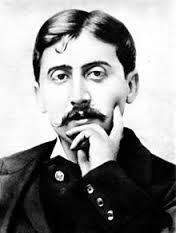 Marcel Proust was an odd cat. Poor health immured him for much of his life in his bedroom, whose walls he had lined with cork to keep the world out; he succumbed at 51. And yet he managed to be something of a social prodigy with keen insight into human psychology – displayed in his monumental seven volume opus A La Recherche du Temps Perdu (commonly translated as Remembrance of Things Past).
Marcel Proust was an odd cat. Poor health immured him for much of his life in his bedroom, whose walls he had lined with cork to keep the world out; he succumbed at 51. And yet he managed to be something of a social prodigy with keen insight into human psychology – displayed in his monumental seven volume opus A La Recherche du Temps Perdu (commonly translated as Remembrance of Things Past).
This was my first birthday gift to my wife-to-be, just weeks after we met, in 1988.

I did most of the reading. It helped me comprehend better, and I enjoyed the challenge. The problem was that Proust is famous for his long, convoluted, digressive sentences – so one had to plunge into a sentence without knowing where it would go or what its logic would turn out to be, making course corrections of tone and inflection as one went along.
I had actually read it all before, after a friend strongly recommended it. But that didn’t help much, as it was in the ‘70s when I did not know, to use the technical terminology, my ass from my elbow. In particular, the topic of homosexuality pervades the work, but mostly that had gone right past me without really registering. Indeed, in part at least, this is indicative of how “under the radar” the whole gay thing was in those ancient times, in contrast to today.
One thing I did vividly remember, after slogging through all seven prolix volumes without, frankly, getting all that much out of them, was the ending.

So I was somewhat surprised when my wife and I at last reached the final line, without the dramatic thunk (or “shoulders”) I thought I’d remembered. Now, we were reading the C.K. Scott Moncrieff translation, as revised by Terence Kilmartin in 1981, the best known one; so naturally I wondered whether what I’d read before was simply a different translation. So I went online and learned that prior to 1980 there was only one other English translation, of the last volume only. It’s unlikely I read that; more likely what I had read before was the Scott Moncrieff version prior to Kilmartin’s revision. With some further effort I was able to find a different translation of the book’s ending, but that didn’t conform to my recollection either.

Anyhow, at my wife’s behest, having after 27 years pretty much forgotten the book’s early chapters, we have started again from the beginning, albeit with the new translation of the first volume by Lydia Davis, which we got from her very own hands.
